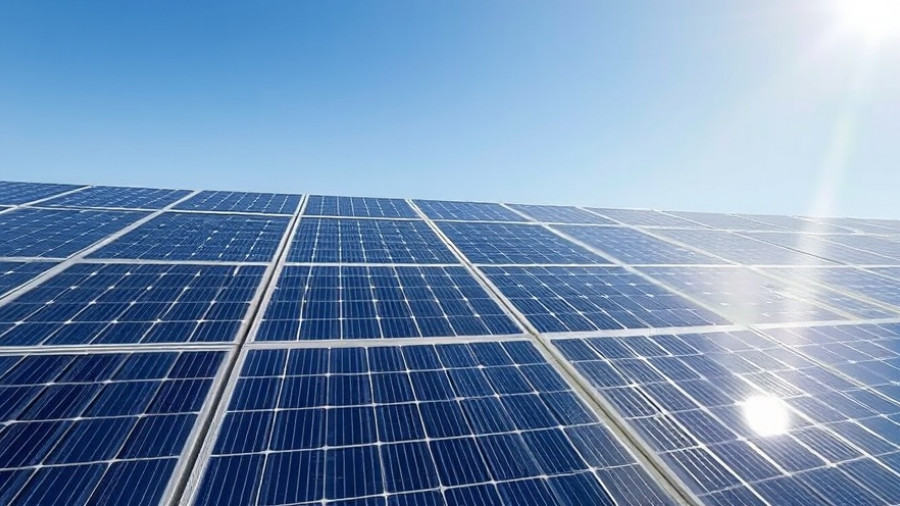
Understanding Solar Panel Efficiency: The Key Metric for Renewable Energy
As the demand for renewable energy continues to rise, solar panel efficiency becomes a hot topic among home and business owners alike. Solar panel efficiency refers to the amount of sunlight that a solar panel converts into usable electricity. With advancements in photovoltaic technology, homeowners can now benefit from increasingly efficient panels that maximize energy production while occupying limited roof space.
What Influences Solar Panel Efficiency?
Various factors influence solar panel efficiency, including the type of solar cells used and their configuration. Currently, monocrystalline panels are the gold standard, achieving efficiencies over 24%, while polycrystalline panels have substantially lower efficiencies. The choice of technology plays a critical role; for instance, newer N-type cells showcase enhanced performance due to better temperature coefficients and reduced degradation rates.
Why Efficiency Matters for Consumers
Higher efficiency panels generate more electricity per unit area, which is particularly advantageous for places with limited rooftops. Roughly, an increase in efficiency translates to less land need for installation, reducing both material costs and carbon footprints. For travelers and eco-tourists opting for sustainable accommodations, investing in high-efficiency panels can significantly affect the carbon footprint of their stay, leading to greener hospitality choices.
Current Leading Solar Technologies
Among the most efficient solar panels in 2025, technologies like heterojunction (HJT) and back-contact cells are noteworthy. HJT cells perform exceptionally well in high temperatures, making them ideal for various climates. Furthermore, the latest advancements predict the emergence of perovskite solar cells, which have the potential to push efficiency beyond 30%, revolutionizing how solar power can be harvested.
The Economic Implications of Solar Panel Efficiency
While high-efficiency panels often come with a heftier price tag, they offer quicker payback periods and longer operational lifespans. In the long run, investing in superior lattice efficiency can lead to enhanced return on investment (ROI). This financial incentive aligns well with the sustainability strategies of hotel owners and resort managers aiming to reduce resource consumption through green technology.
Real-World Implications of Solar Panel Efficiency Ratings
Efficiency ratings also have a practical impact on everyday users. For instance, a panel rated at 20% could meet the energy needs of a small household, while one rated at 25% could support larger energy demands. Consumers should consider efficiency ratings holistically—bearing in mind factors such as degradation rates, long-term warranties, and the potential for increased energy costs.
Frequently Asked Questions About Solar Panel Efficiency
How does the temperature affect solar panel efficiency?
Temperature plays a significant role in how solar panels perform. Generally, as temperatures rise, an increase in resistance can lead to a drop in efficiency. Solar panels with lower temperature coefficients handle heat better, which is essential for maintaining performance in warmer climates.
Can the efficiency of solar panels decrease over time?
Yes, solar panels undergo natural degradation due to environmental exposure. Depending on the panel type, efficiency can diminish at rates between 0.25% and 0.55% annually. Thus, selecting high-quality panels with lower degradation rates is crucial for long-term performance.
The Future of Solar Panel Technology
With ongoing research and innovative technologies paving the way, the future of solar panel efficiency looks promising. Fame-driven companies like Maxeon and Aiko Solar are continuously rolling out next-generation products that promise greater efficiency and more robust durability. Coupled with policies that support renewable energy initiatives, the trajectory of solar efficiency advancements is likely to lead to a more sustainable world.
For anyone in the hospitality industry or eco-conscious tourists, keeping abreast of solar panel innovations and efficiency metrics can drive significant reductions in carbon footprints and enhance the sustainability of travel experiences.
Actionable Insights for Sustainability
Travelers, hoteliers, and industry professionals should prioritize incorporating high-efficiency solar panels and promote awareness of their benefits. Implementing these solutions not only bolsters sustainability efforts but also aligns economic incentives with responsible environmental practices. Start taking steps now to embrace renewable energy solutions and make a positive impact on the planet.
 Add Row
Add Row  Add
Add 




Write A Comment